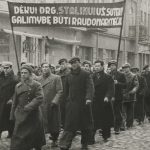Šiauliai during the First Murderous Soviet Stay
According to the plans of the authorities of the Soviet Union, Šiauliai had to be one of the most important strategic points for the deployment of Soviet troops in the country. The 11th Soviet Army deployed in Joniškis, Linkuva, Kuršėnai and Šiauliai regions, while Šiauliai was turned into the headquarters. When the units of the Soviet Army were moving to Lithuania, and later to Šiauliai, the euphoria that overwhelmed Šiauliai inhabitants very recently, a month ago, because the Soviet troops liberated Vilnius from Polish occupation and gave it over to Lithuania, was slowly flagging. The only Jewish community met the coming army enthusiastically, as traditionally since the second half of the 19th century it had many representatives and supporters of the left-wing and communist ideology, supporters of the Communist Party and Komsomol. Other townspeople felt the impending disaster.
The catastrophe brought by the Red Army began from the first days of occupation. Although at first glance, everything seemed to be going on ordinarily, since initially, most of the city institutions were left to work and remained almost non-reformed, but law-based violence began. The city authorities formed by the Soviets began issuing statutory ordinances and resolutions, which stipulated that the inhabitants of Šiauliai city and its vicinities had to build roads, bridges, military objects, bring fire wood from forests for the needs of the Red Army, etc. Four thousand soldiers of the Lithuanian Army were forced to build Gruzdžiai Airport. Farmers were required to transport building materials: stones, gravel, sand, forest products. In addition, it was obligatory to provide the Red Army units with food, and payment for food was much less than the market price. In the city, soldiers of the Army used to take apartments, houses, in some places, entire blocks for their own needs. In addition, local residents and organizations were required to give the weapons to the occupants. Even local police officers were no longer allowed to carry weapons outside office hours.
The overall nationalization wave organised by the occupants in Šiauliai did not miss anything: private flats, all larger residential houses, buses and trucks, hotels (including the main ‘Berlynas’ hotel), trade enterprises were massively nationalized.






Leave feedback